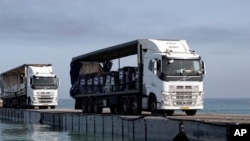Local officials and family members said an Israeli airstrike Tuesday in northern Gaza killed 10 members of Qatar-based Hamas political chief Ismail Haniyeh’s family.
The strike hit a house in the Shati refugee camp west of Gaza City.
Israeli strikes earlier in the war killed three of Haniyeh’s sons.
Israel’s military said its forces carried out airstrikes targeting buildings in Shati and another area in northern Gaza that it said were being used by Hamas militants who were involved in the Oct. 7 attack on Israel.
The latest fighting came as Israel’s Supreme Court ruled that the military must draft ultra-Orthodox Jewish seminary students for military service.
The unanimous decision Tuesday could put additional pressure on Prime Minister Benjamin Netanyahu’s government, which relies on two ultra-Orthodox parties in its coalition.
The war in Gaza and Israel’s clashes with Hezbollah militants along the border with Lebanon have made the issue even more prominent as people questioned the longstanding exemptions that allowed the seminary students to avoid the military service required of most Israeli men and women.
U.S. Secretary of State Antony Blinken on Monday warned Israeli Defense Minister Yoav Gallant against allowing the conflict with Hamas in Gaza to expand to include Lebanon and Hezbollah.
Blinken “underscored the importance of avoiding further escalation of the conflict and reaching a diplomatic resolution that allows both Israeli and Lebanese families to return to their homes,” according to a statement from State Department spokesman Matthew Miller.
Blinken also pressed Gallant to take more steps to protect aid workers in Gaza.
The Israeli defense minister will meet with other U.S. officials during his visit to Washington this week, including Defense Secretary Lloyd Austin.
Earlier Monday, European Union foreign policy chief Josep Borrell told reporters in Luxembourg that the risk of the war spilling over is growing bigger every day.
“I think that, unhappily, we are on the eve of the war expanding,” Borrell said.
He also said a cease-fire in Gaza is desperately needed to facilitate the flow of humanitarian aid, saying “delivery of humanitarian assistance inside Gaza has become impossible.”
A temporary pier that was built for delivering aid into Gaza via a sea route paused deliveries Monday due to “scheduled maintenance,” Pentagon press secretary Major General Pat Ryder told reporters.
Sunday marked the U.S.-built pier’s largest delivery day to date, moving 720 metric tons of aid to the Gaza beach that day. Since the pier began operations on May 17, the U.S. military has delivered more than 6,200 metric tons of aid via the sea route to the Gazan coast for delivery to Palestinians, according to Ryder.
However, aid organizations say corridors intended to funnel that aid from the Gazan shore to Palestinians in need are unsafe and unusable.
Ryder also told reporters Monday that the USS Dwight D. Eisenhower carrier strike group will “remain briefly” in the Mediterranean Sea before returning home. The aircraft carrier left the U.S. Central Command region after being deployed for more than seven months.
The USS Theodore Roosevelt will leave the Pacific region in the coming days to deploy to the Middle East “to promote regional stability, deter aggression and protect the free flow of commerce in the region,” he added.
The war was triggered by the Oct. 7 Hamas attack on Israel that killed 1,200 people according to Israeli officials and led to the capture of about 250 hostages. Israel’s counteroffensive in Gaza has killed more than 37,600 Palestinians, mostly civilians, but also thousands of combatants, according to the territory’s Health Ministry.
Some information for this story was provided by The Associated Press, Agence France-Presse and Reuters



